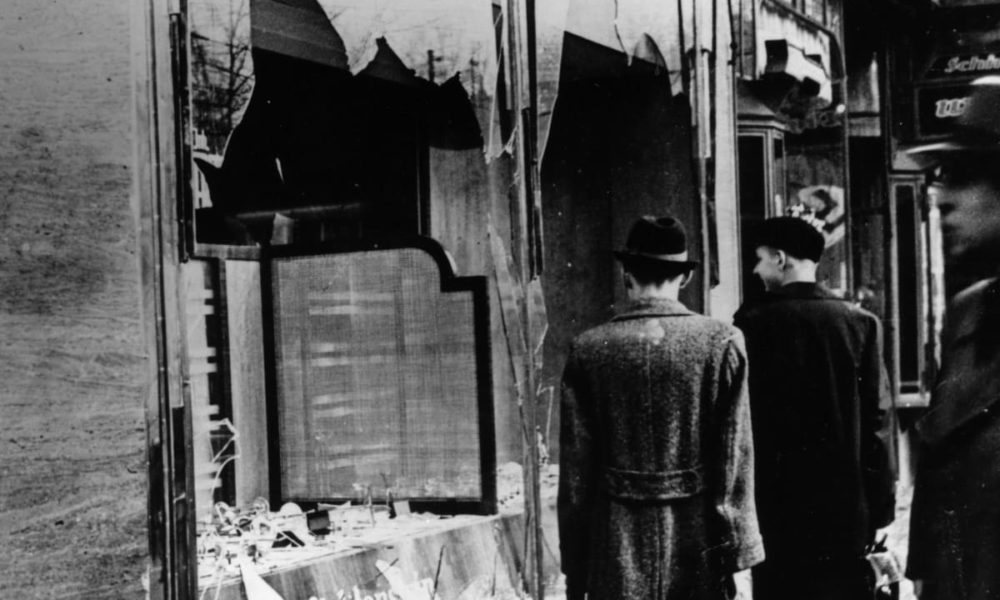Community
96-year-old cellist recalls horror of Kristallnacht

Although 96-year-old cellist, Anita Lasker-Wallfisch, says what she saw as a little girl on the Berlin streets on the morning after Kristallnacht is “indescribable”, the memories are still vivid 83 years later.
“There was liquor – gallons of it – running down the street, and glass. Unbelievable,” Lasker-Wallfisch told Trudy Gold, the former chief executive of the London Jewish Cultural Centre, during a webinar on 9 November organised by the Rabbi Cyril Harris Community Centre (RCHCC) in commemoration of “Kristallnacht”.
During “the Night of Broken Glass” as Kristallnacht is also known, which was a pogrom carried out by the Nazis throughout Germany between 9 and 10 November 1938, synagogues were torched, homes, businesses, and schools vandalised and 30 000 Jewish men were arrested and sent to concentration camps.
Lasker-Wallfisch spoke about surviving the hell of the Auschwitz and Bergen Belsen concentration camps and going on to live an extraordinary life.
Born in Breslau in 1925, Lasker-Wallfisch was one of three sisters. Her father, who had been awarded the Iron Cross in World War I, was a lawyer. Her mother was a violinist and her uncle a chess master.
Lasker-Wallfisch said Germany was at “absolutely rock bottom with tremendous unemployment” when Adolf Hitler started promising to provide jobs if he came into power. “It was all very primitive, really. People thought, ‘If we are working, we are somebody again’, and from that it grew into this madness.”
In 1933, the same year that Hitler came into power, Lasker-Wallfisch experienced antisemitism for the first time. She was an eight-year-old in a private school when her fellow student refused to allow her to wipe the blackboard because she was a Jew.
She said “ridiculous happenings” like that this resulted in the rise of antisemitism. “The poison came in slowly, and took hold.”
Her family unsuccessfully tried to leave the country, although her sister, Marianne, managed to escape to England in 1939.
In April 1942, her parents were deported and murdered. Lasker-Wallfisch and her sister, Renata, were working in a paper factory and spared. They began to forge documents to enable French forced labourers to escape. In September 1942, she and Renata tried to escape, but were arrested by the Gestapo at the train station and imprisoned.
“I wasn’t prepared to sit and wait until somebody came to collect me in order to kill me,” said Lasker-Wallfisch. “That didn’t somehow fit into my repertoire. So, we were quite the cheeky children, we were going to do something to escape. We weren’t successful, but at least we tried.”
According to German law, being arrested as a criminal was still better than being sent to a concentration camp as a Jew.
“A criminal actually got a court case; a Jew got eliminated. So, we advanced to a better category as criminals, which allowed us to stay in prison for about a year. Had I gone straight to a concentration camp, I wouldn’t be speaking to you today.”
The two sisters were sent to Auschwitz in December 1943. Lasker-Wallfisch told the prisoner who shaved her hair that she was a cellist. By the time Lasker-Wallfisch was naked with a number on her arm, the conductor of the Women’s Orchestra of Auschwitz came and asked her if she could play the cello for them. The cello saved her life because cellists were difficult to replace.
In the wake of the Soviet advance, Lasker-Wallfisch and her sister were part of the evacuation from the camp in October 1944.
From the hell of Auschwitz, Lasker-Wallfisch arrived in the hell of Bergen Belsen. After the British army liberated the camp on 15 April 1945, she served as a witness at the Belsen Trial of 1945 before arriving in Britain in 1946. “I was hell-bent on making up lost time. I wasn’t thinking of anything other than starting to catch up with what I had lost – eight years of my life.”
She went on to co-found the English Chamber Orchestra, which today has Prince Charles as its patron, and marry the pianist, Peter Wallfisch. She has two children, four grandchildren, and three great-grandchildren.
Lasker-Wallfisch recounted what she described as her husband’s “mysterious” story of escaping the Holocaust. “A man in Palestine had the brilliant idea to try and save musically talented children. He managed to get an advertisement into the paper in Germany and Austria, asking talented children to present themselves on a certain day. Peter was one of the children chosen.”
Lasker-Wallfisch spoke about how she returned to Germany in 1994, her first time in the country since being liberated from Bergen Belsen. She had noticed that the orchestra she played in was going to tour two towns near Belsen. “I had this inspiration that I would quite like to see what had become of Belsen.” So, she travelled with the orchestra which first touched down in England. While there, the orchestra was waiting for the music stands to arrive when Lasker-Wallfisch was approached by a young German in London who said he could take her to the camp in Belsen. That’s how she returned to Germany.
Since then, she has contributed to various memorials, opening three in Germany.
In 2018, she gave a commemorative speech in the Bundestag, the German federal parliament, to mark the 73rd anniversary of the liberation of Auschwitz.
“That was extraordinary,” said Gold. “You were there with the president of Germany and Mrs Merkel, and your speech was superb. I can remember when we went to Innsbruck, you were awarded a doctorate by 16 different departments in the university and the president of Austria got one. You wrote a brilliant book. When Prince Charles went to Yad Vashem, he talked about you in his address.”
Hazel Cohen, one of the RCHCC’s operations managers, said, “Anita’s story is a testament to the triumph over evil, to the triumph over man’s inhumanity to man.”
